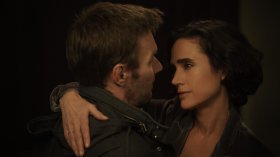ARTS HUB UK — While the films of Martin Scorcese and Francis Ford Coppola form part of the language of contemporary culture, the work of Hal Ashby, another star of the new Hollywood of the 1970s, has suffered from an unjustifiable lack of attention in recent years.
His 1971 film Harold and Maude, based on a debut script by Colin Higgins, tells the story of a lonely, alienated young man whose morbid humour is his only refuge in a world without meaning. Harold shares a luxurious but emotionally arid mansion with his overbearing mother. He has no feelings for the women his mother would like him to marry; nor is he particularly excited by the prospect of the military career his manic Uncle Victor tries to interest him in.
The film begins with Harold hanging from a rope in the drawing room. ‘I suppose you think that’s very funny?’ his mother asks. Her concern is not that her son might be deeply troubled, but that he has yet to grow out of childish play. It is clear from her nonchalant attitude that these mock suicides have been going on for a long time. She leaves any analysis of the problem to the psychiatrist.
To escape his disaffection, Harold attends the funerals of strangers. It is at one such service that he meets Maude: ‘I knew we were going to be friends from the moment I saw you,’ she says. ‘You go to funerals often, don’t you?’
Maude is everything Harold is not: spirited, spontaneous and jocular; she is also seventy-nine years old. Maude believes in living for the day. She enjoys learning new things and is able to take delight in the mere fact of being alive. Through her, Harold begins to discover something beyond his own self-indulgent existential gloom; an unlikely relationship develops.
Hal Ashby’s film is so much more than a quirky little oddity which any summary of it suggests. Its mix of absurdist humour and cultural critique is witty and compelling, but what remains in the mind long after the film has finished, is an uplifting and curiously affecting sense of possibility. The director’s achievement is to make you see that Maude’s carpe diem philosophy is not the sort of easy, empty-headed babble that sophisticated and cynical minds like to dismiss. It is a survival strategy. When Maude inadvertently reveals something about its source towards the end of the film, her defiantly positive outlook is given credibility. It is the most subtle moment in the film and represents the emotional fulcrum of the story.
Hal Ashby died of cancer in 1988 after years in the wilderness. It seems astonishing that his work should have been so neglected ever since. Harold and Maude stands alongside Being There, Coming Home and Bound For Glory as not only some of the most memorable films of a memorable era, but as products of an original imagination. It really is about time they experienced a renaissance.
In the cynical, conservative modern age, daring in mainstream film culture is noticeable mostly by its absence. If, like me, you are more than a little tired of threequels and franchises and blue-screened fantasies, such an original and unpunchably life-affirming picture as Harold and Maude is a breath of fresh air.
Actors:
Director:
Format:
Country:
Release:




